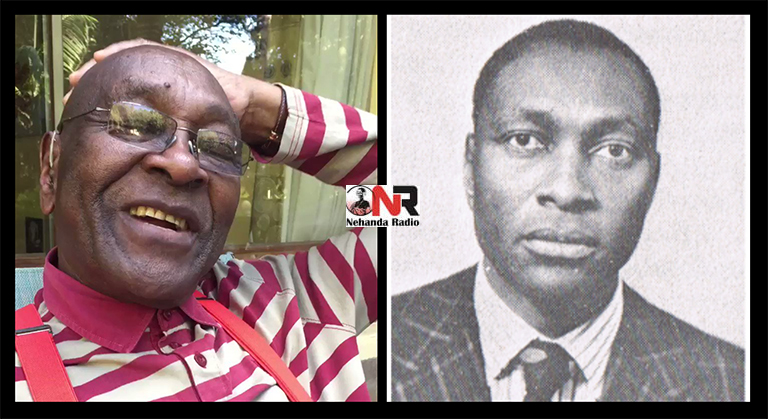By Ken Mufuka
My association with Professor George Kahari was on more than one level. He was the quintessential academic (fundi), eccentric, lovable, exuberant and in these days of fake political professors, a scourge of the charlatan academics.

I had the privilege to hold the portfolio of Black Studies at Lander University, and in that capacity invited him to give a guest lecture on Zimbabwe’s crisis and the death of democracy.
It was winter. Dressed in a tasteful blue black blazer, an oversized scarf, a red tie, (sans overcoat) he was belonged to that genre of scholars called Oxonian. The theater, which held more than 200 souls was packed to the extent that I the organizer, sat on the floor.
He spoke for one hour, without notes; the young scholars were mesmerized and there were some looking into the theater through the windows.
Dr. Noah Manyika remembers him in similar fashion. Hough in his eighties, Manyika says that; “What was more astonishing was the clarity of his mind. He was one of the many brilliant minds the insecure in power choose to ignore.”
I agree. Way back on 2000, Kahari had told me of his observations thusly. The young people of today do not want to go back to the peasant agriculture from which their fathers came from. They want manufacturing jobs.
If ZANU-PF had listened, history might have gone the other way.
The great betrayal
Sad to say, this is one occasion when one can truly say death, after so many betrayed by one’s own, is a blessing.
After 40 years of loyal service at the University of Zimbabwe, Kahari found that his pension fund, which had accrued a sum of over U $2.5 million, was worthless.
He showed me a pay-slip from Old Mutual of Z$83 per month.
He had good reason to be bitter. Like an old warrior, despite the many indignities visited upon him, he carried himself with dignity.
On the day in 2008 when President Robert Mugabe lost the election to the MDC, Kahari told him: “Robert, wadyiwa.” This did not sit well with Mugabe, a vindictive fellow if there was one.
The next day, he was filling petrol at his station when he found that his Election Commission account had been frozen.
“Shoko rabva kuvakuru,” (the word came from above) the attendant said.
Worse was to come. A member of the Central Intelligence told him his name was on the list for disposal. He confronted Mugabe and all the wily fellow could say was pamunhondo pamusasa.
My greatest joy came on my annual visit to the homeland. Kahari was free and honest with his advice.
It met the three Zipra stalwarts at Lonrho House early in my career. They were Kahari, Herbert Munangatire and James Chikerema. I had written some bad words about Stanley Mudenge in the Sunday Mail and Minister Herbert Ushewokunze had called me for a reprimand.
“Sekuru, “ Ushe said, “ this is not a seminar. We shoot people like you.” When I told Kahari and my Zipra comrades, Kahari was their spokesperson.
“Ken, Mazezuru aya don’t care about your brains. The white man was bad but he had some respect for ability and skill. I tell you Ken, with your gifts, you will be better off in America than you will be working with these Mazezuru.”
I returned to Lander University and remained there for the next 36 years.
Kahari’s bitterness was therefore shared by all the saints.
A scholarly giant
When I read his vita at Lander, in 2010, he had written 22 books and numerous learned articles. As a pioneer Bantu Studies scholar at the University of Zimbabwe, he had attracted the attention and support of a group pioneering scholars, at first the laughing stock of the Eurocentrics.
These were Aaron Hodza, Aeneas Chigwedere, Solomon Mutswairo and John Chimhundu. Though all these were mighty men of learning, Kahari and Chimhundu stand out as chief apostles. These two set out on a path that was time consuming and tiresome, a field called lexicography, and the study of the meaning of words.
A minimum of ten years is required just for baptism and twenty years for confirmation. In today’s Zimbabwe, only Chris Mutsvangwa and I belong to this club. With Kahari gone, Chimhundu is now the pre-eminent apostle. In Zimbabwe today, any man whether scholar or ignorant, desiring an honest living cannot hope to flourish among the Philistine leadership.
I mention this because, as Dr. Manyika has already mentioned, the presence of such bona fides scholars who are untainted by political favors in Zimbabwe makes the Philistines jealous and vindictive.
Having lost his pension, Kahari suffered the humiliation of working on an annual contract till he was 90 years old. I am ashamed for myself and for my country and for what my people have done to their own.
One aspect of Kahari’s character was that he did not suffer quietly. He was loud about the indignities heaped upon him by lesser men and this was one reason why he was so loathed among the Philistines. The Philistines prefer that those whose livelihoods they have stolen pray five times a day, facing east, and singing pagan songs.
Mugabe woye woye,
Mugabe chete chete.
To the end, Kahari refused to bow down to the altar which the Philistines had built for him.
Practical advice
As a man of the church, I have found that when such a pillar of society passes away, it is unwise to leave the widow in the house in which they have lived for half a century.
If there are children abroad, it behooves them to remove the spouse form the presence of the deceased for a prolonged period; otherwise the remaining spouse will not heal.
I am aware of travel restrictions. I speak from the experience of loss of my mother and father as well as from the experience gained in a church leadership position.






